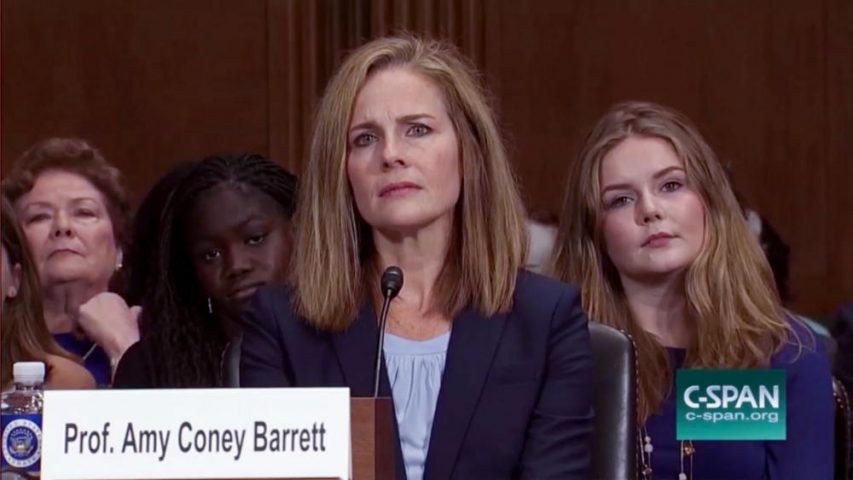The Irony of the Left’s Opposition to Barrett

What Went Wrong in the Sexual Revolution? New Documentary Takes a Look
July 6, 2018
LifeNews: Pro-Abortion Women Go on “Sex Strike” to Save Roe v. Wade
July 6, 2018
It is based largely on an article she wrote with which it agrees.
By George Neumayr, American Spectator, July 6, 2018
For most Senate Democrats presiding over judicial confirmations, the only good Catholic is a bad one. They will only confirm Catholic nominees who reject authoritative Church teaching in favor of liberalism.
In the presumed pro-life conscientiousness of Amy Coney Barrett, the Democrats smell big trouble. But the irony of their fears about the “dogma living loudly within her” is that it sparked off an article she wrote long ago expressing an opposition to the death penalty with which most Democrats agree. The bigotry of Dianne Feinstein’s remark was compounded by its cluelessness. She was chastising Barrett not for holding a traditional Catholic view but for deferring to a modern liberal one held by many churchmen. This is probably one of the reasons why liberal Catholic Tim Kaine ended up voting to confirm her to the federal appeals court.
The Democrats cast her as a carbon copy of Antonin Scalia, for whom she clerked. But at least on the subject of the death penalty and the recusal of Catholic judges, that’s not the case. Scalia never showed the slightest bit of deference to the philosophical mess made by modern churchmen on the question of the death penalty, with their it-is-almost-always-wrong hedging, a view that makes no sense if the death penalty is intrinsically unjust.
The death penalty is either right or wrong: if the latter, it can never be applied; if the former, it can be applied to anyone committing a capital offense. The last pope, who unfortunately went along with the incoherence of the it-is-almost-always-wrong view, still sensed the position was too flaky and unresolved to punish Catholic public figures for not observing it. To the American bishops, Joseph Ratzinger wrote:
… if a Catholic were to be at odds with the Holy Father on the application of capital punishment or on the decision to wage war, he would not for that reason be considered unworthy to present himself to receive Holy Communion. While the Church exhorts civil authorities to seek peace, not war, and to exercise discretion and mercy in imposing punishment on criminals, it may still be permissible to take up arms to repel an aggressor or to have recourse to capital punishment. There may be a legitimate diversity of opinion even among Catholics about waging war and applying the death penalty, but not however with regard to abortion and euthanasia.
Whatever the post-Vatican II Church is calling an “official teaching” on the death penalty isn’t a binding, infallible teaching but simply an opinion currently in vogue amongst a hierarchy in hock to the modern liberal zeitgeist.
“Unlike such other hard Catholic doctrines as the prohibition of birth control and of abortion, this is not a moral position that the Church has always — or indeed ever before — maintained,” wrote Scalia in First Things. “The current predominance of opposition to the death penalty is the legacy of Napoleon, Hegel, and Freud rather than St. Paul and St. Augustine.” Scalia was appropriately scornful of the willingness of the modern Church to fool around with a perennial teaching, to the detriment of other crucial teachings and to the detriment of a strong Catholic presence in public life:
… I do not think it would be a good thing if American Catholics running for legislative office had to oppose the death penalty (most of them would not be elected); if American Catholics running for Governor had to promise commutation of all death sentences (most of them would never reach the Governor’s mansion); if American Catholics were ineligible to go on the bench in all jurisdictions imposing the death penalty; or if American Catholics were subject to recusal when called for jury duty in capital cases.
I find it ironic that the Church’s new (albeit nonbinding) position on the death penalty — which, if accepted, would have these disastrous consequences — is said to rest upon “prudential considerations.” Is it prudent, when one is not certain enough about the point to proclaim it in a binding manner (and with good reason, given the long and consistent Christian tradition to the contrary), to effectively urge the retirement of Catholics from public life in a country where the federal government and thirty-eight of the states (comprising about 85 percent of the population) believe the death penalty is sometimes just and appropriate? Is it prudent to imperil acceptance of the Church’s hard but traditional teachings on birth control and abortion and euthanasia (teachings that have been proclaimed in a binding manner, a distinction that the average Catholic layman is unlikely to grasp) by packaging them — under the wrapper “respect for life” — with another uncongenial doctrine that everyone knows does not represent the traditional Christian view? Perhaps, one is invited to conclude, all four of them are recently made-up. We need some new staffers at the Congregation of Prudence in the Vatican.




